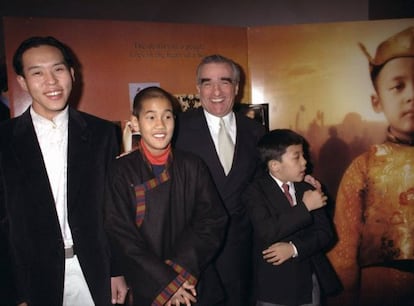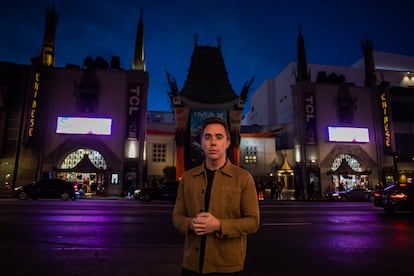Why Hollywood now needs China more than China needs Hollywood
In October 2020, the Asian country overtook the US for the first time in terms of box office receipts. The power of the Chinese authorities is now such that they can veto an American film or actor if they so desire


In February 2012, a smiling Xi Jinping, then the vice-president of the People’s Republic of China, concluded an official visit to the United States with an LA Lakers basketball game in Los Angeles. The politician was finalizing the details of what would be, one month later, the summit between presidents Hu Jintao and Barack Obama. That morning, then-US Vice President Joe Biden had called on his opposite number to address one of the most-pressing issues on the agenda. In the heart of the movie industry, Biden suggested closing a deal that the major studios in his country had been calling for for years and that would allow them to open 34 films a year in China, instead of the dozen or so that were shown every year since the mid-1990s. What’s more, the studios would go from keeping 13% of box office takings to 25%. Xi agreed, and the deal changed Hollywood.
Before this deal, the money from the Chinese box office was viewed as something of a little bonus. “After that agreement, China became a fundamental part of all major studios’ business strategy,” explains Erich Schwartzel, a journalist from The Wall Street Journal and the author of the recently published book Red Carpet, which lays out the history of Beijing’s growing influence over what the world sees on the silver screen.
Schwartzel, 35, spent five years researching the book and has discovered details that could appear mere anecdotes, but in reality, form part of a strategy for control by the Communist Party authorities over the image projected by one of the most-consumed cultural industries on the planet, and that is in a process of transformation given the rise in streaming and the fight between studios to remain relevant. According to the journalist, Hollywood has spent decades caving into the demands of the Asian powerhouse.
In 1996, for example, a Disney executive’s phone rang and on the other end of the line there was a Chinese diplomat who was calling from the embassy in Washington with a warning: they were concerned because two days before, Martin Scorsese had begun to film Kundun, a movie about the Dalai Lama. The call forced the home of Mickey Mouse to seek the advice of Henry Kissinger, the politician who brought US president Richard Nixon together with Mao Zedong in 1972.
Michael Eisner, the then-CEO of Disney, came up with a number of formulas to avoid the anger of Beijing, but at the same time, he knew that canceling a film shoot directed by one of the biggest names of cinema would be a major scandal. So the movie got made.

It premiered on December 25 on just two screens in the United States, while other movies that opened that day were present in some 1,700 theaters. Disney let the movie die. China, Schwartzel writes, “has the power to change movies from the early stages of a project.” When the authorities hear that a script could be problematic, he continues, “they immediately send a letter saying that it would be a bad idea.”
There are dozens of such cases. Sony had to navigate the same waters to complete Seven Years in Tibet, another story about the reincarnation of Buddha. Pressure from China on India, where the production was due to be filmed, forced a change of continent: in the end, it was shot in South America.
Schwartzel also argues that Richard Gere’s activism in support of a free Tibet turned the actor into a toxic asset. Despite his fame in the 1990s, nowadays he appears mostly in independent productions and has not participated in a project with a major studio for more than a decade. “It’s interesting that Hollywood, faced with the pressures of China, has not found creative ways to work within the system, but rather has caved to their demands,” the author states. “It says what it has to say or ignores what it has to ignore.”
The power of China, a country with 1.4 billion inhabitants, is not just about how many ticket-buyers it has. The authorities have at their disposal a catalog of coercive measures. These range from a veto on directors or actors, to the imposition of sanctions on the companies who own the studios, something that can cost billions of dollars.

Chinese censors, meanwhile, work with a list of taboo subjects that oblige studios to recut their movies for local markets. Bloody sequences should be avoided, as should plotlines involving ghosts, or where the government is corrupt (unless the politician in question is American, something that made Netflix show House of Cards a local phenomenon). On more than one occasion, changes have been made to classics. Recently, Fight Club saw its ending changed for broadcast via a streaming service in China.
In October 2020, China overtook the United States for the first time in terms of box office receipts, with $1.998 billion. It has managed this milestone in just 20 years. The local industry has grown, Chinese films have grown up, and viewers want to see their own stories on the screen. That is why Beijing is rejecting more movies than before. “The message is that they no longer need Western films,” Schwartzel explains. “The relationship began with China needing Hollywood. Later they both had a mutual dependency, and now Hollywood needs China more.”
Tu suscripción se está usando en otro dispositivo
¿Quieres añadir otro usuario a tu suscripción?
Si continúas leyendo en este dispositivo, no se podrá leer en el otro.
FlechaTu suscripción se está usando en otro dispositivo y solo puedes acceder a EL PAÍS desde un dispositivo a la vez.
Si quieres compartir tu cuenta, cambia tu suscripción a la modalidad Premium, así podrás añadir otro usuario. Cada uno accederá con su propia cuenta de email, lo que os permitirá personalizar vuestra experiencia en EL PAÍS.
¿Tienes una suscripción de empresa? Accede aquí para contratar más cuentas.
En el caso de no saber quién está usando tu cuenta, te recomendamos cambiar tu contraseña aquí.
Si decides continuar compartiendo tu cuenta, este mensaje se mostrará en tu dispositivo y en el de la otra persona que está usando tu cuenta de forma indefinida, afectando a tu experiencia de lectura. Puedes consultar aquí los términos y condiciones de la suscripción digital.








































